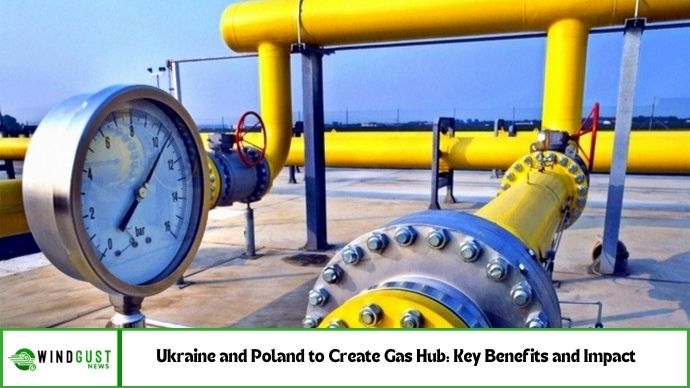Ukraine and Poland will create a gas hub to replace the transit of Russian gas Ukraine and Poland are planning to establish an Eastern European gas hub to supply the region with gas from sources independent of Russia, according to the Ukrainian Ministry of Energy.
Deputy Minister of Energy, Mykola Kolisnyk, highlighted that the cessation of Russian gas transit would act as a catalyst for developing alternative energy routes and resources. One key element of this shift is the increasing role of liquefied natural gas (LNG) in the EU’s energy mix.
“The integration of gas markets using existing infrastructure and expanding interstate capacity will drive trade growth and enable the replacement of Russian gas with energy from independent sources,” Kolisnyk explained.
He also mentioned that combining Ukraine’s underground gas storage with Poland’s LNG terminals could create a new business model that would replace traditional Russian gas transit. This approach, based on existing infrastructure and enhanced capacity, aims to fully substitute Russian gas with alternative sources.
Ukraine has already reached out to Poland to discuss agreements focused on enhancing the capacity of interstate entry-exit points within the gas transportation system. The Ministry of Energy emphasizes that the goal is to create a business model similar to the American system, allowing Ukraine and Poland to store sufficient gas f
Why a Gas Hub is Crucial for Ukraine and Poland
A Response to Geopolitical Tensions
The decision to create a gas hub comes as Europe seeks alternatives to Russian energy supplies. The invasion of Ukraine by Russia in 2022 has sparked a widespread reassessment of energy dependence on Moscow. Ukraine and Poland are stepping up to provide a solution that enhances regional energy security.
Reducing Dependency on Russian Gas
For decades, Europe has been heavily reliant on Russian natural gas. However, the war in Ukraine has made clear the risks associated with such dependency. The new gas hub will not only help reduce reliance on Russia but also provide more stable and reliable energy routes for the region.
How the Gas Hub Will Function
Infrastructure and Connectivity
The gas hub will involve the construction of pipelines and facilities that allow for the import, distribution, and storage of natural gas. This infrastructure will connect Ukrainian and Polish gas networks, with the goal of enabling the transport of gas from alternative sources such as Norway, the US, and other EU countries.
Energy Storage and Distribution
The hub will also feature advanced storage facilities, ensuring that there is a reserve of gas for times of high demand or supply shortages. This will further protect the region from energy disruptions.
Strategic Benefits for Europe
Enhancing Energy Security
The creation of this gas hub will provide a more diversified energy supply for Europe, mitigating the risks posed by any single supplier, particularly Russia. By linking Ukraine and Poland’s energy networks with other European countries, this project enhances the resilience of the continent’s energy infrastructure.
Economic and Political Impact
The gas hub will also have significant economic benefits, including job creation in construction, operation, and energy management sectors. Politically, it strengthens the cooperation between Ukraine and Poland, showcasing their shared commitment to European energy security and sovereignty.
Supporting European Green Transition
This move is aligned with Europe’s broader goal of reducing its carbon footprint and transitioning to greener energy sources. The infrastructure developed through the gas hub can be adapted for future energy needs, including renewable sources like hydrogen, aligning with EU climate goals.
Challenges and Considerations
Financial and Technical Hurdles
Building the necessary infrastructure for a functional gas hub is no small feat. The project will require substantial investment and coordination between multiple stakeholders, including national governments, private companies, and European institutions.
Political and Market Uncertainties
As with any major energy project, political and market dynamics could pose challenges. Regulatory issues, competition for investment, and geopolitical risks will need to be managed to ensure the project’s success.
May you also like it:
The Russian Economy on a War Footing: How Commodity Exports Finance…
EU’s Moment of Truth on Ukraine is Fast Approaching
Opinion: Europe Should Be Afraid If Putin Accepts US Peace Plan
Conclusion
The creation of a gas hub between Ukraine and Poland is a crucial development in Europe’s efforts to secure its energy future. This initiative not only provides an alternative to Russian gas but also strengthens the political and economic ties between Ukraine, Poland, and the broader European Union. As energy security becomes an increasingly critical concern, this gas hub represents a proactive step toward reducing vulnerability to external pressures and ensuring a stable, diverse energy supply for Europe.
Frequently Asked Questions (FAQs)
1. What is the purpose of the gas hub between Ukraine and Poland?
The gas hub aims to reduce Europe’s dependency on Russian gas by providing alternative energy routes, enhancing regional energy security.
2. How will the gas hub improve energy security for Europe?
By diversifying the sources and routes of natural gas, the hub reduces reliance on a single supplier, particularly Russia, making Europe’s energy infrastructure more resilient.
3. What countries will benefit from the gas hub?
Ukraine, Poland, and other European Union countries will benefit from more reliable and diversified gas supplies, contributing to greater energy stability.
4. How will the gas hub impact European energy markets?
The hub will increase competition in energy markets, potentially lowering prices and improving the reliability of gas supplies across Europe.
5. What other sources of gas will the hub include?
The hub will facilitate the import of natural gas from alternative sources like Norway, the US, and other EU countries.
6. Are there any environmental benefits to this project?
While focused on natural gas, the infrastructure could be adapted for future renewable energy projects, such as hydrogen, aligning with Europe’s green transition goals.

